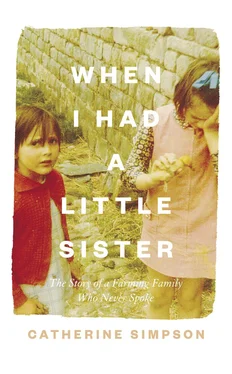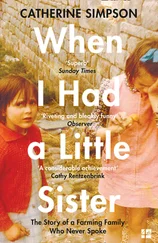For years it will take nothing but the sight of tinsel in a window or the feel of Christmas in the air to bring me crashing back to this moment when my heart was broken.
The family farm where Tricia lives, near Dad, is in Lancashire. I am in Scotland. Elizabeth is in the Midlands. The world seems impossible and chaotically out of control.
I am panic-stricken and fight the desire to tear at my hair. I sob as I stumble to the car, aware that all around me shoppers still shop, shopkeepers still sell, and for everyone else Christmas continues.
Cello drives us home and I say, ‘I hope Tricia is alive and this is a horrible mistake; if not, I hope she is dead.’ I cannot bear the thought of Tricia in a coma, Tricia in a hospital bed, Tricia suffering any more than she already has over so many years.
We arrive home and I throw things into a suitcase, folding on top a black funeral dress and black shoes. I also put in my iPod which I think may help us choose the funeral music. Everything is in a state of confusion and turmoil and uncertainty but a part of me has gone hard, cold and distant. I have begun to organize, to plan, to try to wrest some control from a world turned ugly and terrifying.
Over and over I try to reach Elizabeth. Does she know anything else? Have I imagined this whole nightmare? But I can’t get through. There is no answer at Dad’s house. There is no answer at Tricia’s farmhouse. Where is everyone? I sit at the kitchen table with my coat fastened up to the chin waiting for Cello to drive me 170 miles to the farm. I am icy, I am shaking and my ears are full of a high-pitched ringing. I am not fully in the room; I am here but I am not here. For the moment I have been removed from my body.
My mobile rings and I grab it. It’s Johnny again: there has been no mistake. The worst has happened. Tricia is dead.
I expect my dad to die. I do not think he can survive the discovery of the body of his youngest daughter.
After the three-hour drive from Scotland I walk into Dad’s living room, breathless and dizzy.
It has not killed him.
He is sitting in his armchair. He looks at me and shakes his head and he is crying. ‘Poor lass, she didn’t know what she was doing. Poor lass.’ He will repeat this many times over the next few weeks.
I gather the story, about how Dad knocked on the farmhouse door this morning to ask did Tricia want a newspaper? He was going to the shop. Did she want her usual tin of tuna? Soup? When he got no answer he didn’t go to the shop. He went home for his lunch but could barely eat – he felt something was wrong. It wasn’t unusual for Tricia not to answer the door. She had poor sleep habits and was often in bed at odd hours. Still, Dad sensed something was very wrong.
Phoning was no use – Tricia’s phone was out of order. The last thing she’d said to him yesterday was: ‘Don’t worry; I’ll sort out the phone tomorrow.’ He’d dropped her at the farmhouse yesterday evening after taking her for a new prescription because the psychiatrist had been out to the farm and upped her medication. A new prescription had pleased Dad. It meant things were being done. We all lived in hope of new pills and revised prescriptions because then we could imagine that something was being done . Dad drove her for the new pills – pleased he could also do this to help since the doctors had taken away Tricia’s driving licence. He dropped her back at the farmhouse afterwards where she’d said, ‘Don’t worry, we’ll sort everything out tomorrow.’
While forcing his lunch down he resolved to break in – he was now convinced she was lying in bed too ill to get up. He knew which windowpane in the conservatory could be forced from the outside and he went straight back to the farmhouse to gain access.
Knocking the window open caused the whole sill of plants to crash to the floor, some smashing, all spilling soil and grit onto the lino. He stepped through the window, crunching over the pot fragments and scattered plants, and went into the house.
This is when he found the body of his youngest daughter.
He could not call an ambulance because of the broken phone so he dashed back to his own house, four hundred yards up the lane, to dial 999. Then he returned to the farmhouse and sat there, waiting.
I cannot imagine the world at this time. I cannot imagine Dad in the house alone with Tricia’s body.
Twenty minutes later the police arrived, and then an air ambulance landed in the field opposite. As the paramedics ran inside Dad said, ‘I’m afraid you’re too late.’
After they confirmed Tricia was dead the paramedics tried to contact family members for Dad, using an old mobile of Tricia’s with barely any charge or signal. Dad couldn’t use a mobile because of his hearing aid and the paramedics said they weren’t allowed to explain the situation to Johnny when he answered Elizabeth’s phone. Elizabeth was in the shower and as Johnny tried to get her attention and hand her the phone it got cut off. This is what caused the chaotic half-messages that Chinese-whispered their way to me.
Sometime after the paramedics left the farmhouse Tricia’s mental-health worker drove into the yard for an appointment. Tricia had a history of acute depression and visits from the mental-health or crisis teams were daily by then. The policeman went outside to explain what had happened. The woman did not come in to speak to Dad but stayed in her car writing notes before driving off.
Mrs Smith, a neighbour from up the lane, had seen the helicopter land and ran down to the farm. She poked her head into the farmhouse and asked the policeman, ‘Is it Stuart or is it Tricia?’ The officer was relieved to hand Dad over to a friendly face but Dad didn’t want to leave Tricia alone in the house with police searching through her bedroom and her private belongings, tramping up and down the stairs looking for a suicide note.
Mrs Smith eventually coaxed him away. The policeman stayed on in the house, waiting for the ambulance to take her body to the mortuary.
The countryside can be enveloped in a heavy silence and, as the policeman waited alone with Tricia’s body, the quiet must have seemed crushing.
An hour later, when Elizabeth and Johnny arrived at the farmhouse, they told the policeman who they were and Elizabeth made Johnny go and check on Tricia first. She was covered in a blanket. Johnny went to look – this was only the third time he had ever seen Tricia – and he reassured Elizabeth: it’s OK. Elizabeth went to see her but afterwards said she wished she hadn’t.
By the time I arrived, Tricia had gone.
I saw her on the Monday morning. The mortuary was tucked down the side of Lancaster Royal Infirmary in a single-storey, white building. I knocked on the door and a small man in late middle age answered. He ushered me and Elizabeth in. He looked sad even though he must greet bereaved relatives every day. He hesitated outside the door to the viewing room and looked at us, from one to the other; he clearly saw a family resemblance between us and Tricia. ‘She was very young,’ he said.
She was forty-six. Three years younger than me, and six years younger than Elizabeth.
Elizabeth hung back for a second. ‘Take a minute; whenever you are ready,’ he said, but I was keen to see Tricia. I felt I’d let her down by not being able to make contact with her sooner – she’d now been dead two days.
I pushed the door open.
Her hair had been brushed away from her face in an unfamiliar style but otherwise it was Tricia lying there on a table wearing her work clothes – the dark blue jacket and jeans she wore to feed and muck out her horses.
Her hand was chilled. I touched it and asked her, out loud, ‘Oh, Tricia, what have you done? What have you done?’
Читать дальше












